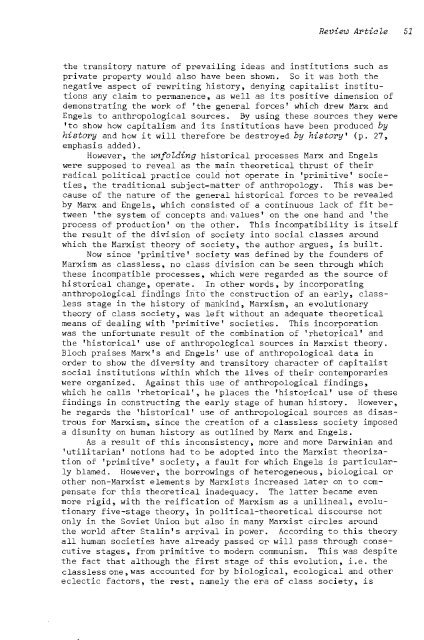CONTENTS NO.I - Institute of Social and Cultural Anthropology ...
CONTENTS NO.I - Institute of Social and Cultural Anthropology ...
CONTENTS NO.I - Institute of Social and Cultural Anthropology ...
You also want an ePaper? Increase the reach of your titles
YUMPU automatically turns print PDFs into web optimized ePapers that Google loves.
Review Article 51<br />
the transitory nature <strong>of</strong> prevailing ideas <strong>and</strong> institutions such as<br />
private property would also have been shown. So it was both the<br />
negative aspect <strong>of</strong> rewriting history, denying capitalist institutions<br />
any claim to permanence, as well as its positive dimension <strong>of</strong><br />
demonstrating the work <strong>of</strong> 'the general forces' which drew Marx <strong>and</strong><br />
Engels to anthropological sources. By using these sources were<br />
'to show how capitalism <strong>and</strong> its institutions have been produced by<br />
history <strong>and</strong> how it will therefore be destroyed by history' (p. 27,<br />
emphasi s added).<br />
However, the unfolding historical processes Marx <strong>and</strong> Engels<br />
were supposed to reveal as the main theoretical thrust <strong>of</strong> their<br />
radical political practice could not operate in 'primitive' societies,<br />
the traditional subject-matter <strong>of</strong> anthropology. This was because<br />
<strong>of</strong> the nature <strong>of</strong> the general historical forces to be revealed<br />
by Marx <strong>and</strong> Engels, which consisted <strong>of</strong> a continuous lack <strong>of</strong> fit between<br />
'the system <strong>of</strong> concepts <strong>and</strong>ivalues' on the one h<strong>and</strong> <strong>and</strong> 'the<br />
process <strong>of</strong> production' on the other. This incompatibility is itself<br />
the result <strong>of</strong> the division <strong>of</strong> society into social classes around<br />
which the Marxist theory <strong>of</strong> society, the author argues, is built.<br />
Now since 'primitive' society was defined by the founders <strong>of</strong><br />
Marxism as classless, no class division can be seen through which<br />
these incompatible processes, which were regarded as the source <strong>of</strong><br />
historical change, operate. In other words, by incorporating<br />
anthropological findings lrit6-the construction <strong>of</strong> an early, classless<br />
stage in the history <strong>of</strong> mankind, Marxism, an evolutionary<br />
theory <strong>of</strong> class society, was left without an adequate theoretical<br />
means <strong>of</strong> dealing with 'primitive' societies. This incorporation<br />
was the unfortunate result <strong>of</strong> the combination <strong>of</strong> 'rhetorical' <strong>and</strong><br />
the 'historical' use <strong>of</strong> anthropological sources in Marxist theory.<br />
Bloch Marx's <strong>and</strong> Engels' use <strong>of</strong> anthropological data in<br />
order to show the diversity <strong>and</strong> transitory character <strong>of</strong> capitalist<br />
social institutions within which the lives <strong>of</strong> their contemporaries<br />
were organized. Against this use <strong>of</strong> anthropological findings,<br />
which he calls 'rhetorical', he places the 'historical' use <strong>of</strong> these<br />
findings in constructing the early stage <strong>of</strong> human history. However,<br />
he regards the 'historical' use <strong>of</strong> anthropological sources as disastrous<br />
for Marxism, since the creation <strong>of</strong> a classless society imposed<br />
a disunity on human history as outlined by Marx <strong>and</strong> Engels.<br />
As a result <strong>of</strong> this inconsistency, more <strong>and</strong> more Darwinian <strong>and</strong><br />
'utilitarian' notions had to be adopted into the Marxist theorization<br />
<strong>of</strong> 'primitive' society, a fault for which Engels is particularly<br />
blamed. However, the borrowings <strong>of</strong> heterogeneous, biological or<br />
other non-Marxist elements by Marxists increased later on to compensate<br />
for this theoretical inadequacy. The latter became even<br />
more , with the reification <strong>of</strong> Marxism as a unilineal, evolutionary<br />
five-stage theory, in political-theoretical discourse not<br />
only in the Soviet Union but also in many Marxist circles around<br />
the world after Stalin's arrival in power. According to this theory<br />
all human societies have already or will pass through consecutive<br />
stages, from primitive to modern communism. This was despite<br />
the fact that although the first stage <strong>of</strong> this evolution, i.e. the<br />
classless one, was accounted for by biological, ecological <strong>and</strong> other<br />
eclectic factors, the rest, namely the era <strong>of</strong> class society, is

















